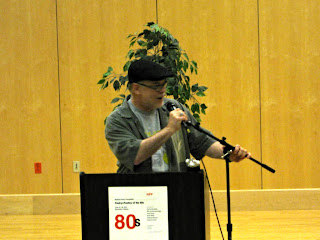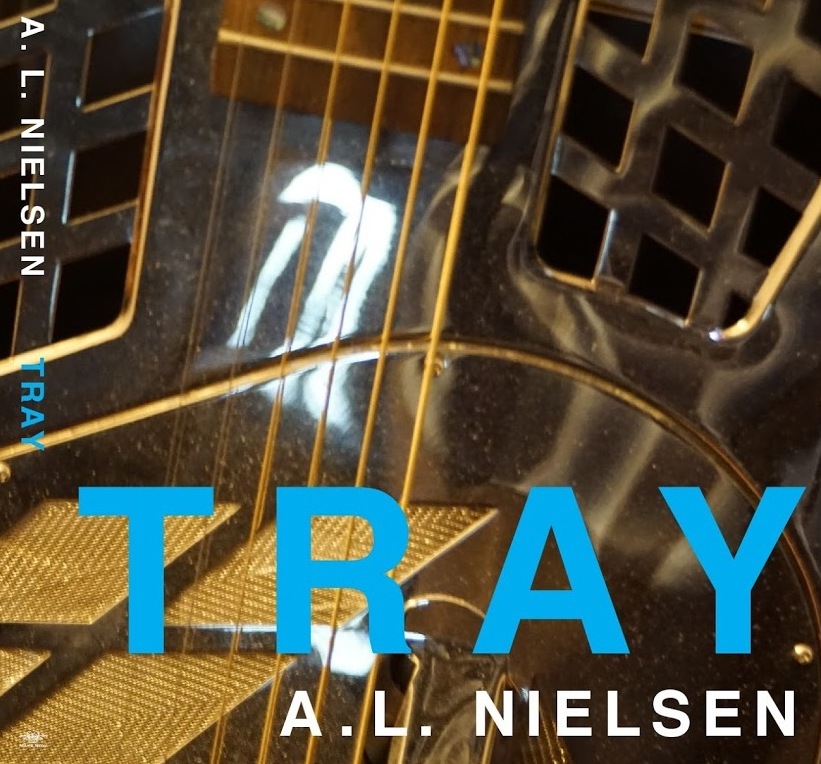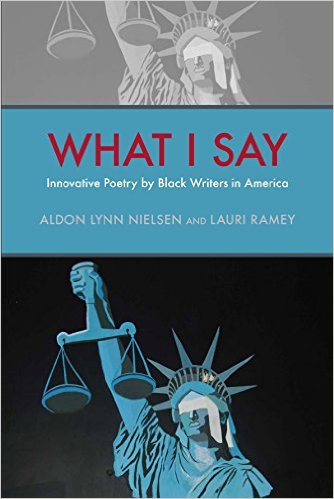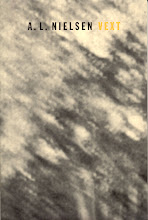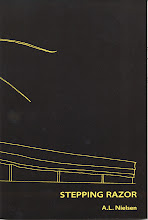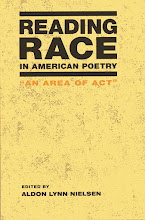j/j hastain and I collab on "Close/Closet Read" of
Aldon Nielsen's
MIXAGE:
Steve:
Jesus, this is a smart, wise (and also FUN), intelligent, serious book.
There’s SO MUCH new, (C)old reliable, mature Nielsen in it that I almost cannot recognize who the pomer was or what he used to write in that previous time when few would have been ready for this, anyhow, that now forgotten era during which he also wrote so darn well that this new incarnation should surely not be any sort of surprise at all, and yet it's so amazingly compact and lucid.
There’s something here for everyone who can dance (on any size pins and needles), the damage done entirely amphibiously, if not altogether aquatic.
j/j:
a beginning or a next
perhaps jazz-ly, but so by improvisation and not by way of the jazz ‘standard’—histories being perplexed by momentary perceptions--“a huddle of saints and angels waits to be worked”—Nielsen’s mixage is itself a working, out and through the saints and angels that wait—working by integrations and inclusions--the vitality of these acts. As Nielsen brings layers and splices to surface, we are compelled. Sometimes by abruptness and sometimes gentler--sometimes leaving us with blanks (literal space on the page) and sometimes leaving us with gaps (sudden or subtle stoppages in rhythmic flow)—we move through Nielsen’s document where supple meat makes new motions—we begin to pant--pant to de-limit, to engage—“and wound itself around the majestic book”—we recognize ourselves as coming closer to, by way of “the most wonderful specimen of composition.”
On "Manufacturer's Warning" (which opens the collection):
Steve:
Key term is "upon," the pun pivots on that word.
Is the "manufacturer" "God," the proverbial creator of the world? Or the author, who warns readers about the ensuing poetry?
j/j:
to begin with a ‘warning’? certainly a pungent attention-grabbing auditory-ness—a punch--which is often how that first, dragging melody emitted from the saxophone, sounds—my need to view the introduction as an invitation without didactic, means that in my read, there is no “God” nor hierarchal “author” –but instead the primary melody coming out of what was prior to it, dark and not yet sound-filled, space. the dark of the book before it opens.
Steve:
Yep, that’s what I figure, too. _MIXAGE_ (author/poet) mocks such “divine inspiration” for the poem/poming, as well as most all other paleo-tightie-whitie-mindset, anthropomorphic deity and other hierarchal, totalizing reading/production, interpretation, agency, and reader-prescriptions. You write, “coming out of what was prior to it,” oh, okay, I can go along with that. Yes, nice!
The earth rotates. The ensuing poetry in _MIXAGE_ will "rotate," also. Musical discs "rotate" on a phonograph, also. Words (and "meaning" rotate in reader's mind. Last, this poetry's "surface" will mix and mix and mix is its underlying "core" spins "upon" or should/would that be "on" its axis.
Are we readers really being warned that it is dangerous in "play upon" the "rotating surface" and if we are prohibited from sitting or standing, also, then "how on earth," will we keep our balance or remain securely rooted? Naw, I believe that the "warning" is ironic and we are being encouraged to "play" upon the ensuing "surface" and abandon "flat earth," mono-dimensional thinking altogether.
j/j:
yes Steve! I agree—not so much a didactic, finger-wagging ‘warning’--but a deep push. A push toward proceeding without fear of falling—
Steve:
Yes, if anything, I’d expect A. L. N. to make fun of “didactic” wherever/whenever possible…
Steve:
Finally, I recall a book or line by Ron Silliman or maybe Barrett Watten, _Stand, Sit, *******" something-or-another and also the start to Watten's book _Progress_, something like, _*******, Attention!_.
Whoops, sorry, I'll have to look those up in my library, j/j.
j/j:
also yes—to begin a text with a gesture of attention. a calling forth. interesting to consider that the ‘heralding’ of sorts—is an announcement that though seems to be coming from a centralized voice (as we spoke of above—“God”or “author”?), throughout the book itself, voice is more multi-chromatic/multi-resonant. sounds and text like sewing, pulls new ways of thinking, into form—“I don’t know but appears to me” “we speak the names of our languages into an incomprehending (as opposed to uncomprehending) hold.”
Steve:
Yep, languages PLURAL. Absolutely, multi-chromatic, yep.
I love that, j/j – “sound and text like sewing, pulls new ways of thinking, into form,” REALLY nice, that, yep.
"After Jealousy" (the second poem in the collection):
Steve:
What's the most "habituated" suffix/meaning/word when American readers see "under?" Understanding is, I would say, the most "habituated" term/suffix that we see/hear/read following "under," but Nielsen takes a stanza break and substitutes "side." That is, the "meaning" is "along the underside," where "dirty" stuff resides. Often "beneath" us, as in beneath our more dignified and polite moral sensibility. Hence, "beneath Notice." But then, if it's "beneath / Notice," then we would, declining to get our hands dirty, so to speak, fail to see what may be necessary and vital and useful and important. We may neglect or chance to notice what we actually NEED (to notice). We may also MISS what is necessary and vital once the "snow jobs" are removed, once the lies and lying are eliminated, once we are not snowed under the bull short and the crap.
j/j:
what you say here about what is left once “the bull shit and the crap” are removed—is important. I think you translate Nielsen in this poem, very well. from here--what is the relationship between understanding and undercarriage? or what gaps between them? I ask because I want to know what would happen if our quest to intake and undertake came from there being no gap or separation between what we consider ‘ourselves’ (reason for understanding) and where what we are ‘removing’ is located (undercarriage). or—what type of life wherein there is no longer any need to remove “the bull shit and the crap”—what if we noticed that “the bull shit and the crap” were dramatically of our own making, and what would it mean for us to consider ‘ourselves’ responsible for the necessary removals and upkeep of removals applied? perhaps speaking on the level of a new ethics, where habituated limit and norm are substituted with “slatted” skies? skies that are more than partially able to be seen-through. or—what is on the other side of sky? I believe that Nielsen is encouraging that we shift our attention to these…
Steve:
Why are the skies "slatted?"
May be a pun on some Zukofsky, but I believe "The order of" is a compound noun, as Nielsen sets the verb "snows" off with a line break and then emphasizes one word, "Here," with a Cap H. He then gets or delivers "snows" as BOTH noun AND verb, "the order of [as noun] snows [as verb] / Here."
But also, these are surfaces of snows, and, again, we are encouraged to LOOK beneath several surfaces. Well, then, if we do look "underneath" and through the several surfaces of snow (jobs) we will encounter "mountains" of meaning, a "Music" of the "orders" (BOTH arrangements and commands) of enormous GROUND.
j/j:
just to affirm that this is beautiful and relevant and true here. good.
"Supple Meant," the third poem in the collection, is a gorgeous poem, j/j:
j/j:
I could not agree more about the beauty of “Supple Meant”—surely a pun on “supplement”—but also in my hearing (in the context of music)—this supple meat! the poem itself a type of supple meat but also, our reading it—a fleshy flexibility.
Steve:
A pun on "supplement," of course, but the poem IS supple in its delicate, flexible, sensuous sound, too, isn't it. I LOVE the word "generously," and also "generous," used this way. You may recall a line of my own in _Rugh Stuff_: "generous trousers." I LOVE using "generous" that way. And OLD art/poetry, Synonyms are like OLD, that is, butterfly collecting, eh? I mean, "drying its wings under the noon sun," yes, you too read this poem this way?
j/j:
on use of the word “generously”—yes. I too read the poem this way. what do the wings of a synonym look like? feel like? you mention your use of word “generous” in your _Rugh Stuff_ in the paragraph above, the closeness there—and I too wish to speak of a resonant intimacy with my own work. the relation of synonym to image. are images themselves synonyms for felts? “drying its wings under the noon sun” is to me a thorough image, and also an action. so let’s say gesticulation—and what other synonyms for refined gesticulations like these?—which are moments.
also—did the “jealously eyed” make the synonym’s wings dry? beautiful—perplexing.
Steve:
That is a damn nice two lines, isn't it. "He jealously eyed the synonym / Drying its wings under the noon sun." And then "Fiercely desiring that whose place / it had so generously taken." Gorgeous! Fucking Gorgeous!
"Oklahoma" must also be the movie _Oklahoma_, though the artificial nature, though, the real landscape being so vast and acrid and bland versus the movie set so "staged" and phony and fake.
which brings us back to the nature of the Synonym, how it fucks up what is REAL and original and True NATURE and wild and not man-made or artificial or reductive (using language in plae of actual, concrete reality.
j/j:
interesting here Steve. I hear what you are saying in the read of Nielsen’s—but I do not think that I can agree that the Synonym “fucks up what is REAL”—perhaps because for me what is REAL is often something that in some way responds to “man-made thought.” a vital after, folding. I am talking about compositions that have within them, bridges to future (I know in previous posts you have said “future does not exist”--) that are not inherently ‘natural’ but in some way combined. that the compositions that feel resonant and reviving for me are often provoked by convergence between a thing of (I believe you are referring to it here as “True NATURE”)—organic, green etc. and something rigorously else. a robotic arm coadunated with a deep tree. this co—to me is original. and I am trying to consider synonyms for these feral unions—however divergent they may seem. to consider things in regard to their potency or their potentials, rather than in the context of how they have been historically categorized.
Steve:
It's "blasted," as in "sand-blasted," stripped mined or stripped, totally raped and pillaged by WORDS and language and artificial, man-made thought.
j/j:
I appreciate the strength of your feeling here. I however, think that words can be an inherent part of “True NATURE.” (if) they come from the reach of human-animals, which are organisms. the desire to communicate—the desire to commune. I also think that the particular shape of the particular beaver’s home (the sticks used, the shape), is itself part of “True NATURE.” I see words and language (if a part of the vivid experiences of us as organisms (rather than used for bureaucracy or hierarchal gain, or any other number of hurtful/harmful approaches) as powerfully poised purpose. as yet another way to get into our senses and deepest probabilities concerning a new ethics.
Steve:
Hence "his screen," what in truth his human ego and "intelligence" (verbal=human) uses (uses) to filter, clean, strip, sift from the original substance of its original and true nature. God, we've fugged up this planet with our awful, wretched, disgusting human "intelligence," haven't we? "But deep in the basement," "filmy" (dirty, scummy), the original Oklahoma's gather. In the Unconscious, I gather...
j/j:
What of our “intelligence” is wretched, awful or disgusting? I wonder—because to me, there is only fault in the arrogant, self-preferring perspectives designed to set us apart from_______--designed to increase chasms. I think that it is possible for us to renovate our lives and acts and bodies so that we continually configure from the ‘truths’ of “the deep basement” where the “filmy” (rather than dirty, scummy--could also be complex, mysterious, still in need of engagement, still un-adulterated by the arrogances of ‘surface’ living) originals still exist. I think that depending on how we engage them, the “Oklahoma” that gathers—can in many ways be the words themselves. to re-vigorous language so that it is us—is our moments combining, rather than language being a thing that controls us or a thing that we use to control________.






















